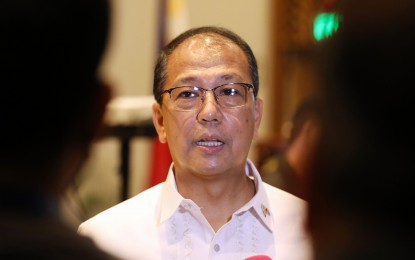
OPAPRU chief Carlito Galvez Jr. (File photo)
MANILA – The Office of the Presidential Adviser on Peace, Reconciliation and Unity (OPAPRU) on Sunday said it is hopeful that the death of Communist Party of the Philippines (CPP) founder Jose Maria "Joma" Sison will put an end to the local communist insurgency which has largely stalled development in the countryside.
"With the death of Mr. Sison, it is our hope that it will also put an end to the local communist armed conflict that claimed the lives of so many Filipinos and pushed back development in the countryside," OPAPRU chief Carlito Galvez Jr. said in a statement Sunday.
He also noted that the passing of Sison marks “the end of an era in the nation's history.”
"It was a period largely defined by armed hostilities, which to this day, is still being felt by Filipinos, especially those whose lives were affected by the communist movement," Galvez added.
With President Ferdinand R. Marcos Jr.'s banner of unity, Galvez said the government shall vigorously carry out interventions to sustain and build on the gains the government has achieved under the peace process.
"We, therefore, once again call upon the remaining members of the communist movement across the nation to abandon armed struggle, return to the fold of the law and rejoin mainstream society," he added.
Take advantage of gov’t aid
Galvez also urged the remaining rebels to take advantage of the socio-economic assistance the national government provides to former rebels, now called friends rescued, under its Local Peace Engagement and Transformation Programs.
"Now is the time for all of us Filipinos to unite and work together to bring a just and lasting peace to our country," Galvez said.
The CPP earlier said the Netherlands-based Sison died around 8:40 p.m. Friday after two weeks of confinement at a hospital.
Sison's death came as the CPP is marking its 54th foundation anniversary on Dec. 26. He founded the organization in 1968.
He was arrested during the time of President Ferdinand Marcos Sr.– the father of the incumbent president - in 1976, along with his wife.
They were released from detention in 1986 after President Corazon Aquino came to power.
In 1987, Sison went on a self-exile in the Netherlands after peace talks with the government stalled.
Peace talks were on and off since then until President Rodrigo Duterte terminated the negotiations in November 2017.
The CPP has the New People's Army (NPA) and the National Democratic Front (NDF) as its armed and political wings, respectively.
Philippine National Police (PNP) chief Gen. Rodolfo Azurin Jr. for his part, said while they are condoling with the family of the late CPP founder, they expressed regret that the deceased will no longer be brought to trial for the atrocities by the NPAs in the past years.
In a radio interview, Azurin also urged all remaining insurgents to rejoin mainstream society and live peaceful lives anew.
Conclude decades-long insurgency
Meanwhile, Negros Occidental Governor Eugenio Jose Lacson said the passing of Sison must also conclude the decades-long insurgency.
"The moment has come to end the armed conflict in the country so that we can effectively work towards lasting and genuine peace," Lacson who chairs the Provincial Task Force to End Local Communist Armed Conflict said, adding that the government has been in the pursuit of peace for a long time.
Lacson has been urging the remaining members of CPP's armed wing, the New People’s Army (NPA), to surrender, telling them that “choosing peace is always the better choice” and that the provincial government is "eager to welcome you back as we vow to build a stronger and progressive Negros Occidental."
The province, he added, is working closely with the Department of the Interior and Local Government, the Armed Forces of the Philippines and the Philippine National Police together with civil society groups and multi-stakeholders to implement peace-building activities, particularly in the rural communities affected by the insurgency. (with reports from Lloyd Caliwan, Nanette Guadalquiver/PNA)
